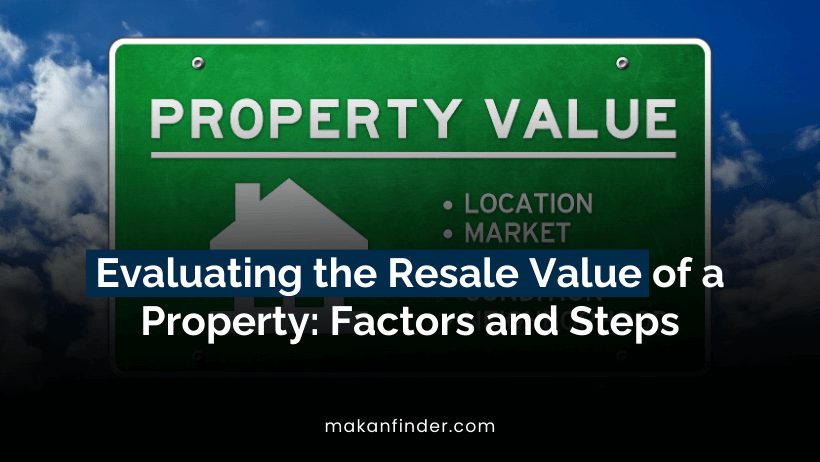The Resale value of a property: Definition
The resale value of a property is the estimated worth or market price at which it can be sold in the future. It represents the potential financial return a seller can expect when selling the property after a certain period of ownership. Several factors influence the resale value, including the property’s location, condition, features, market conditions, historical price trends, and nearby development and infrastructure.
The location of a property is a key determinant of its resale value. Desirable locations with convenient access to amenities, good schools, and a safe neighborhood tend to command higher prices. The property’s condition and features also play a significant role. Well-maintained properties with modern amenities, updated designs, and energy-efficient features often have higher resale values. Additionally, market conditions, such as supply and demand dynamics, interest rates, and overall economic conditions, can impact the resale value. Analyzing historical price trends and considering any planned development or infrastructure projects in the area can provide insights into the potential future value of the property. By considering these factors, buyers and sellers can make more informed decisions about the resale value of a property.
How To Evaluate The Resale Value Of A Property?
Evaluating the resale value of a property involves considering various factors that can influence its market worth. Here are some key steps to help you evaluate the resale value of a property:
1. Conduct Comparative Market Analysis (CMA):
A CMA involves researching and analyzing similar properties in the same area that have recently sold or are currently on the market. Look for properties that are comparable in terms of size, location, features, and condition. Analyze their sale prices to get an idea of the potential resale value of the property you’re evaluating.
2. Assess Property Features and Condition:
Evaluate the specific features and condition of the property. Consider factors such as the size, layout, number of bedrooms and bathrooms, amenities, and any unique selling points. Additionally, assess the condition of the property, including its age, maintenance history, structural integrity, and any necessary repairs or renovations. Properties in better condition and with desirable features generally have higher resale value.
3. Consider Location:
Location is a crucial factor in determining property value. Assess the property’s proximity to amenities such as schools, parks, shopping centers, transportation hubs, and employment opportunities. Evaluate the neighborhood’s desirability, safety, and future development plans. Properties located in prime or up-and-coming areas often have higher resale value.
4. Examine Market Conditions:
Evaluate the current state of the real estate market. Consider factors such as supply and demand dynamics, local economic conditions, interest rates, and market trends. A strong seller’s market with high demand and limited inventory tends to drive up property values, while a buyer’s market with low demand can lead to lower values.
Seek advice from real estate agents or appraisers who have expertise in the local market. They can provide insights and help estimate the resale value based on their knowledge and experience. Real estate professionals have access to comprehensive market data and can provide a more accurate assessment of property value.
6. Factor in Future Potential:
Consider any future developments or infrastructure projects planned in the area. Upcoming improvements like new schools, transportation upgrades, or commercial developments can positively impact property values. Conversely, potential negative changes, such as the construction of a nearby highway or zoning changes, should also be taken into account.
7. Evaluate Historical Price Trends:
Examine historical data on property values in the area. Look for trends over time to determine whether property values have been increasing or decreasing. This analysis can provide insights into the potential resale value of the property.
8. Adjust for Market Influences:
After gathering all the relevant information, make adjustments to the estimated resale value based on the specific characteristics of the property you’re evaluating. Consider factors such as unique features, renovations or upgrades, or any significant drawbacks that may affect the property’s value compared to similar properties in the market.
Keep in mind that property valuation is an estimation and can be influenced by various factors. It’s advisable to consult with professionals and conduct thorough research to obtain the most accurate evaluation of the property’s resale value.
In conclusion, evaluating the resale value of a property is a multi-faceted process that requires considering various factors. Factors such as the property’s location, condition, features, market conditions, historical price trends, and potential future developments all play a significant role in determining its market worth. By conducting comparative market analysis, assessing property features and condition, considering location, examining market conditions, consulting real estate professionals, evaluating historical price trends, factoring in future potential, and adjusting for market influences, a more accurate estimation of the property’s resale value can be obtained. However, it is important to remember that property valuation is not an exact science and can be influenced by market fluctuations and individual circumstances. Seeking professional guidance and conducting thorough research can help in making more informed decisions regarding the resale value of a property.




